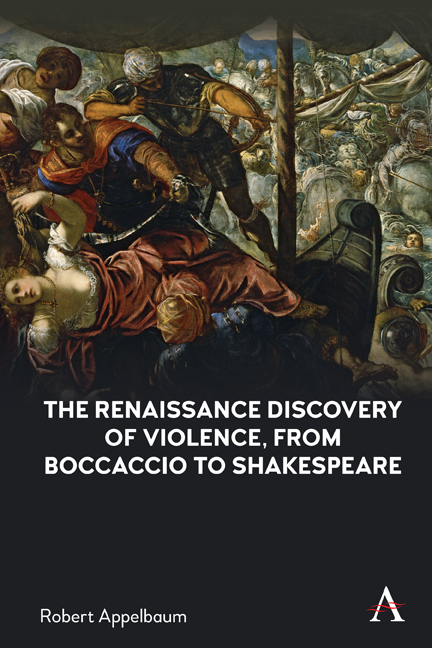Book contents
- Frontmatter
- Dedication
- Contents
- A Note on the Texts
- Acknowledgments
- Preface
- Chapter One Overture: The Show of Violence
- Chapter Two The Moral Economy of Violence in the Renaissance Novella Collection: Straparola, Bandello and Marguerite de Navarre
- Chapter Three Pacifism, Erasmus and More
- Chapter Four Violence as Labor: The Heroic Narrative
- Chapter Five “Tragedy Shows Us What We Must Flee From”
- Afterword
- Select Bibliography
- Index
Chapter Five - “Tragedy Shows Us What We Must Flee From”
Published online by Cambridge University Press: 16 December 2021
- Frontmatter
- Dedication
- Contents
- A Note on the Texts
- Acknowledgments
- Preface
- Chapter One Overture: The Show of Violence
- Chapter Two The Moral Economy of Violence in the Renaissance Novella Collection: Straparola, Bandello and Marguerite de Navarre
- Chapter Three Pacifism, Erasmus and More
- Chapter Four Violence as Labor: The Heroic Narrative
- Chapter Five “Tragedy Shows Us What We Must Flee From”
- Afterword
- Select Bibliography
- Index
Summary
Another Country
Drama is another country. And tragedy is a precinct all its own. It is true that dramas can be read, and some dramas have been written to be read. It is true too that if tragedy is its own precinct, it has many wards, and each ward can have its own traditions, values and assumptions. Still, on the subject of depicting violence, tragedy, for all its varieties, would seem to be uniquely charged and equipped to come to terms with it, for the common theme of tragedy in every ward is unnatural suffering, pain and grief, primarily at the hands of violent men and women and pitiless gods, and its common attitude is seriousness, what Aristotle called spoudaios. It has little use for the “moral economy” of violence, as in the novella, which caused the novella to arrive at a preliminary and often facetious balance sheet of good and evil, even in the face of outrageous injustice; nor is it disposed, in its main action, toward the heroic labors of violence as in epic and romance. Instead it aims toward provoking a specific effect, Aristotle's “pity and fear” and “catharsis.” In fact, there was a great deal of debate in the Renaissance, especially in Italy, about what “catharsis” and “pity and fear” referred to, and about how important they were in relation to other fundamental qualities of tragedy, like spoudaios, magnitude, catastrophe and recognition. But few if any disagreed that tragedy had a specific effect, which involved emotional and moral provocation. Neither the novella nor the romance was designed to elicit that effect, even in the case of tragic tales in novelle and tragic episodes in epic and romance.
Talking about the “effects” of tragedy may seem overly utilitarian; but the subject was a major part of discussions of tragedy among critics and theorists, as well as among anti-theatrical polemicists, and it is not a utilitarian effect that I will be discussing here, but rather an immediate response by spectators to the experience of drama.
- Type
- Chapter
- Information
- Publisher: Anthem PressPrint publication year: 2021



